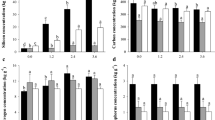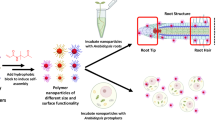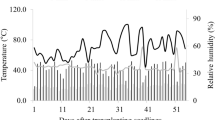Abstract
IN a letter to NATURE1 we communicated the results of experiments carried out on maize plants using radioactive phosphorus as an indicator of the behaviour of the phosphorus atoms. The results obtained showed unambiguously that the greater part of the phosphorus atoms present in the leaves and in the roots of the plants investigated is not permanently in one place, but migrates from leaf to leaf. We extended the experiments described above and investigated the behaviour of phosphorus in the sunflower.
This is a preview of subscription content, access via your institution
Access options
Subscribe to this journal
Receive 51 print issues and online access
$199.00 per year
only $3.90 per issue
Buy this article
- Purchase on Springer Link
- Instant access to full article PDF
Prices may be subject to local taxes which are calculated during checkout
Similar content being viewed by others
References
NATURE, 137, 66 (1936).
Author information
Authors and Affiliations
Rights and permissions
About this article
Cite this article
HEVESY, G., LINDERSTRØM-LANG, K. & OLSEN, C. Exchange of Phosphorus Atoms in Plants and Seeds. Nature 139, 149–150 (1937). https://doi.org/10.1038/139149a0
Issue Date:
DOI: https://doi.org/10.1038/139149a0
This article is cited by
-
K. U. Linderstrøm-Lang
Ergebnisse der Physiologie Biologischen Chemie und Experimentellen Pharmakologie (1961)
-
Studies of mineral nutrition by use of tracers
The Botanical Review (1955)
-
Isotopes as tracers in plants
The Botanical Review (1950)
-
Die Bedeutung der Nucleinsäuren für das Wachstum und die Eiweißsynthese der Zelle. Zusammenfassende Übersicht
Zeitschrift für Krebsforschung (1942)
Comments
By submitting a comment you agree to abide by our Terms and Community Guidelines. If you find something abusive or that does not comply with our terms or guidelines please flag it as inappropriate.



